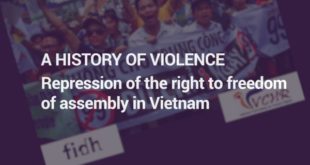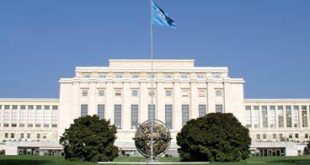Biography
of the UBCV Fifth Supreme
Patriarch Thich Quang Do
Thich Quang Do, secular name Dang Phuc Tue, was born on 27 November 1928 in Thanh Chau village in Thai Binh province (northern Vietnam). He became a monk at the age of 14. In 1945, when he was just 17, he witnessed the summary execution of his religious master, Thich Duc Hai, by a revolutionary Peoples Tribunal. His master had simply helped to relieve victims of the grave famine in North Vietnam, but the Communists accused him of using religion as “opium of the people” and shot him dead. “At that precise moment”, wrote Thich Quang Do in an Open letter to Communist Party Secretary-general Do Muoi in 1994, “I realized that Communism does not serve mankind. I decided never to accept violence, cruelty, hatred or discrimination. Then and there, I vowed to combat fanaticism and intolerance, and devote my life to the pursuit of justice through the Buddhist teachings of non-violence, tolerance and compassion”.
An outstanding scholar and talented writer, from 1951-1957, Thich Quang Do spent 6 years as a Research Fellow of Buddhist and Indian philosophy at several universities in Sri Lanka and India, including the Vishava Bharati University in Santiniteketan, Bengal. During the 1960-70s, he was Professor of Oriental Philosophy and Buddhist Studies at Van Hanh Buddhist University (Saigon), the Faculty of Letters of Saigon University and the Hoa Hao Buddhist University in Can Tho. In 1971-72, he taught Buddhist studies at the Pontifical College Pius X in Dalat. Despite his exile and banishment by the communist authorities in 1982, his scholarship and vision earned him widespread respect, even in Communist Party circles. In the official magazine Van Hoc (Literary Studies, No 4, Hanoi, July- August 1992), Thich Quang Do is highly praised for his wisdom and extensive knowledge by a communist scholar who visited him during his years in internal exile in Vu Doai.
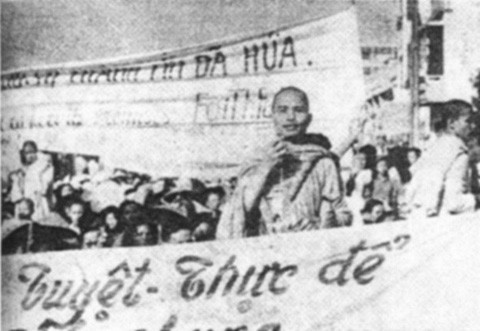 |
|
Thich Quang Do speaks at a rally for religious freedom in Saigon, 1963
|
Thich Quang Do’s convictions led him to oppose authoritarian repression under many different political regimes. After Vietnam was partitioned by the 1954 Geneva Agreement, he became a prominent figure in the protest movement against the anti-Buddhist policies of the Ngo Dinh Diem regime in the South. On the night of 20 August 1963, he was arrested along with thousands of Buddhists in a massive Police sweep launched by the Diem government in Hue and Saigon. Thich Quang Do was brutally tortured in prison. Despite this, he continued resistance in prison. As one of the rare UBCV monks to speak English, he secretly translated articles from the international press on the Buddhist struggle which were smuggled in by Buddhists with his meals. These articles were reprinted in Buddhist newspapers, and helped to inform Buddhists and boost their morale. Released after the fall of the Diem regime on 1st November, Thich Quang Do’s health was seriously damaged by the brutal torture. He suffered gravely from tuberculosis for three years, and was sent to Japan in 1966 for a lung operation. Before returning to Vietnam, he spent two years travelling and studying in Taiwan, Hong Kong, Thailand and Burma.
After the Unified Buddhist Church of Vietnam (UBCV) regained its legitimate status at a nation-wide Congress in Saigon in 1964, Thich Quang Do was appointed UBCV Spokesman and Inspector of the UBCVs Executive Institute (Vien Hoa Dao, the Institute for the Dissemination of the Dharma) in 1972. He became the Executive Institutes Secretary-general in 1974. Throughout the Vietnam War, along with other UBCV leaders, Thich Quang Do took an active stance in favour of peace.
After the Communists took power in 1975, a fierce campaign to suppress Buddhism was launched in South Vietnam. UBCV property was confiscated, its institutions dismantled, thousands of monks were arrested or forcibly drafted into the army. As Secretary-general of the UBCVs Executive Institute, Thich Quang Do sent thousands of letters to the authorities protesting specific cases of religious repression. All copies of the letters were destroyed in July 1982 when Police seized the UBCVs headquarters at An Quang Pagoda. It took 5 days to burn the UBCVs documents and files.
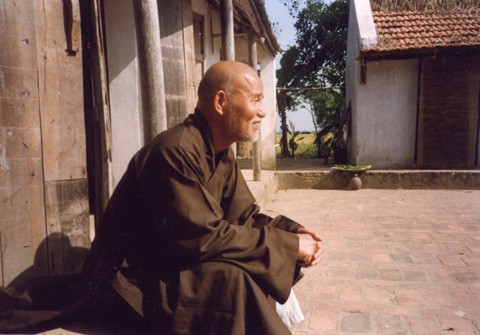 |
|
Thich Quang Do in internal exile in a derelict pagoda in Thai Binh province,
northern Vietnam in 1982 |
Tension reached a climax on 3rd March 1977, when Police attacked and seized the Quach Thi Trang orphanage in Saigon and tore down the “Unified Buddhist Church of Vietnam” nameplate. That day, Thich Quang Do signed a Communiqué summoning all Buddhists to prepare for a non-violent struggle to defend the UBCV and protect religious freedom. This led to his arrest in April 1977, along with Thich Huyen Quang and several UBCV leaders on charges of “anti-revolutionary activities” and “undermining national solidarity”. Thich Quang Do was detained in solitary confinement in Phan Dang Luu Prison for 20 months. Following international pressure, he was released after a brief trial on 10th December 1978. The same year, Thich Huyen Quang and Thich Quang Do were nominated for the Nobel Peace Prize by Irish laureates Betty Williams and Mairead Maguire.
On 25th February 1982, Thich Quang Do was again arrested for opposing the creation of the State-sponsored “Vietnam Buddhist Church”, an organization controlled by the Communist Partys “Vietnam Fatherland Front”, and for resisting efforts to make the UBCV join this State-run body. He was sent into internal exile in the remote village of Vu Doai in Thai Binh Province (northern Vietnam), where he spent 10 years under house arrest. The only reason given for detention was “by carrying out religious activities, you are ipso facto engaged in political activities”.
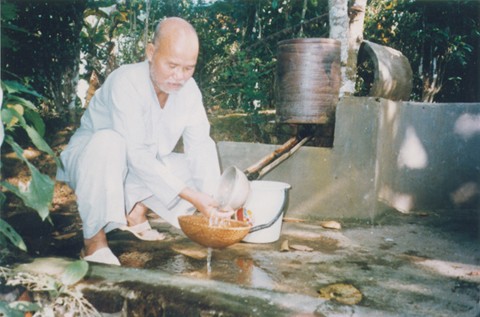 |
|
Thich Quang Do prepares his food in internal exile in Vu Doai village,
Thai Binh province |
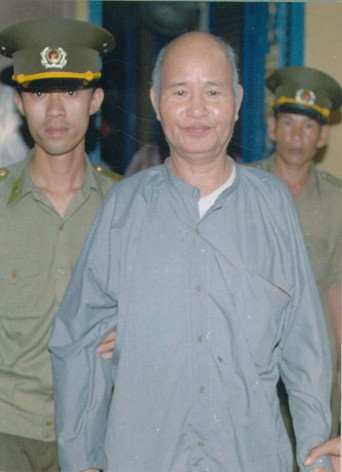 |
|
Thich Quang Do is sentenced to 5 years in prison at the Ho Chi Minh City Supreme Peoples Court on 15 August 1995
|
His 84-year-old mother was exiled with him. She died in 1985 from malnutrition and lack of medical care. In 1990, the Minister of Public Security Mai Chi Tho, one of the regimes most powerful figures, invited Thich Quang Do to visit him in Hanoi and take up a post in the State-sponsored Vietnam Buddhist Church. Thich Quang Do refused.
In 1992, Thich Quang Do broke out of internal exile and went back to the Thanh Minh Zen Monastery in Saigon. Shocked by the governments widespread campaign to suppress the UBCV, notably the systematic destruction of “UBCV” nameplates on all church premises, in August 1994, Thich Quang Do set up a sign on his Monastery inscribed “Exiled Secretariat of the Unified Buddhist Church of Vietnam” and called on Buddhists all over the country to restore UBCV nameplates. The same year, he sent an Open Letter to VCP Secretary-general Do Muoi along with a 44-page document entitled “Observations on the grave offences committed by the Vietnamese Communist Party against the Vietnamese people and against Buddhism”, detailing persecution against Buddhism since 1945. A copy was smuggled to the UBCVs International Spokesman in Paris, Vo Van Ai, requesting that he publish it within 6 months if the government made no reply. In 1994, Thich Quang Do also began organizing the UBCVs activities, mounting a rescue mission for victims of disastrous floods in the Mekong Delta which had left 500,000 people homeless. This was the very first public UBCV mission since the church was banned in 1981. Police intercepted the UBCV convoy as it prepared to leave Saigon on 5 November 1994, confiscated all relief aid and arrested the organizers. Thich Quang Do was arrested on January 4, 1995. He was put on trial as a “Vietnamese delinquent”, not as a Buddhist monk.
For these “crimes”, on August 15, 1995, Thich Quang Do was sentenced to 5 years in prison and 5 years house arrest on charges of “sabotaging national solidarity” and “taking advantage of democratic freedoms to violate the interests of the State and social organizations”. Initially detained in Ba Sao Camp, he was transferred to the notorious B14 Prison near Hanoi, one of Vietnams harshest prisons. Thich Quang Do’s health deteriorated due to harsh conditions and lack of medical care.
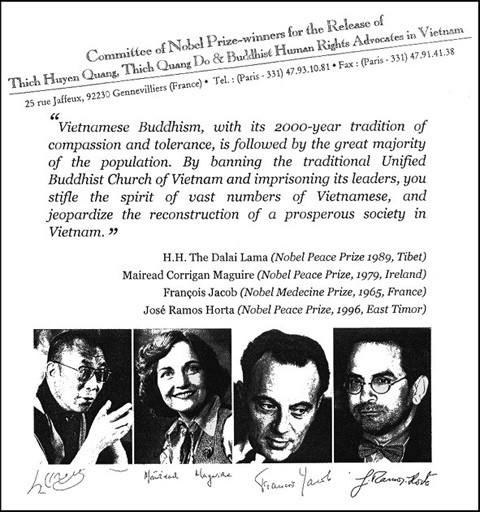 |
|
Four Nobel Peace Prize laureates set up a Committee for the Release
of Thich Huyen Quang, Thich Quang Do and other UBCV leaders |
Thich Quang Do’s arrest sparked off strong international protests among human rights groups across the globe. Four Nobel Prize Winners (HH the Dalai Lama, José Ramos-Horta, Mairead Corrigan Maguire and François Jacob) formed a support committee for his release. The then US Secretary of State Madeleine Albright also demanded his unconditional release.
As a result, Thich Quang Do was released in a government amnesty on 2nd September 1998. He returned to the Thanh Minh Zen Monastery in Saigon, but was maintained under house arrest and strict Police surveillance, with his phone cut and all visits monitored – “I have left a small prison only to come into a larger one”, he said. In October 1998, the UN Special Rapporteur on Religious Intolerance, Abdelfattah Amor was physically impeded from visiting Thich Quang Do by Security Police posted outside his Monastery. Despite these restrictions, Thich Quang Do continued his peaceful combat by writing appeals in a spirit of dialogue to the Vietnamese leadership for the respect of human rights, the release of prisoners of conscience, the abolition of the death penalty, and national reconciliation between Vietnamese of all different opinions. He also pursued his efforts to draw international attention to the human rights situation in Vietnam, writing letters to the European Union, the US Congress and world governments in 1999 with a list of 31 political prisoners.
In 1999, Thich Quang Do was appointed President of the UBCVs Institute for the Dissemination of the Dharma (Vien Hoa Dao), thus becoming the second-ranking UBCV dignitary after the Patriarch Thich Huyen Quang.
In the following years, Thich Quang Do worked tirelessly to organise UBCV welfare, social and humanitarian programmes to promote social justice and aid people in need. In 2000, he personally led a relief mission to aid flood victims in the Mekong Delta. These efforts brought him renewed arrests, interrogations, harassment and accusations of “violating national security”. He also made frequent attempts to visit the Patriarch Thich Huyen Quang, under house arrest in Quang Ngai and Binh Dinh, but was systematically intercepted. In 2006, he was arrested as he tried to board a train to make a New Year visit to the Patriarch, and released only after 40 UBCV monks staged a hunger strike on the station platform.
On February 21st 2001, confronted with the impossibility of any dialogue with the Vietnamese authorities, Thich Quang Do launched an “Appeal for Democracy in Vietnam”, calling on Vietnamese from all political and religious families to rally together around a radical 8-point transition plan for democratic change. The Appeal received overwhelming support, with endorsements of over 300,000 Vietnamese, and over 200 MEPs, Members of the US Congress and international personalities. The government reacted by sentencing Thich Quang Do (without trial) to two years “administrative detention” on June 1st 2001. He was detained incommunicado at the Thanh Minh Zen Monastery, deprived even of medical treatment for his diabetes and high blood pressure. Euro-MP Olivier Dupuis staged a demonstration outside the Monastery in protest on June 6th 2001. He was arrested and expelled from Vietnam.
Released on June 27th 2003 as a result of concerted international pressure, Thich Quang Do was arrested again along with Thich Huyen Quang and several other UBCV leaders on October 8th 2003 after he participated in the UBCV Assembly convened by Patriarch Thich Huyen Quang to elect a new UBCV leadership. Thich Quang Do and Thich Huyen Quang were never formally charged, but were accused of “possessing state secrets” – an offence which carries the death penalty in Vietnam – and placed under strict surveillance at their respective monasteries.
 |
|
Thich Quang Do visits Thich Huyen Quang in 1999 in Quang Ngai where he is under house arrest. It is their first meeting in 17 years
|
In 2005, marking the 30th anniversary of the end of the Vietnam War and the 30 years of the UBCVs movement for religious freedom, democracy and human rights, Thich Quang Do launched two vibrant appeals to the international community and the people of Vietnam. In a video message addressed to the United Nations in April 2005, he argued that even economic development was untenable without democracy and freedom:
“What can we do to bring stability, well-being and development to the people of Vietnam? During my long years in detention, I have thought deeply, and I have come to the conclusion that there is only one way – we must have true freedom and democracy in Vietnam. We must have pluralism, the right to hold free elections, to chose our own political system, to enjoy democratic freedoms – in brief, the right to shape our own future, and the destiny of our nation. Without democracy and pluralism, we cannot combat poverty and injustice, nor bring true development and progress to our people. Without democracy and pluralism, we cannot guarantee human rights, for human rights cannot be protected without the safeguards of democratic institutions and the rule of law”.
Police seized the video and arrested the young monk who filmed it. However, the UBCV network managed to smuggle out an audio version, which was shown by Vo Van Ai at the United Nations Human Rights Commission in Geneva in April 2005.
Thich Quang Do’s “New Years Letter for Pluralism and Democracy” (February 2005) was an unprecedented call for unity, and it represented a turning point in the democracy movement. Addressed to Vietnamese Communist Party (VCP) and military veterans, academics close to the VCP, human rights defenders, cyber-dissidents and democracy activists from all walks of life, this was the first time a UBCV leader had reached out to citizens outside the Buddhists community, and it had a resounding impact, especially on the dissident community in Hanoi. Leading VCP veteran and dissident Hoang Minh Chinh was particularly inspired by Thich Quang Do’s proposals. Indeed, just before his death in 2008 of prostate cancer, this life-long atheist asked Thich Quang Do to convert him to Buddhism and be his master. At Hoang Minh Chinhs funeral in Hanoi in February 2008, monks from the banned UBCV led the funeral rites, and situation unheard of in Communist Vietnam.
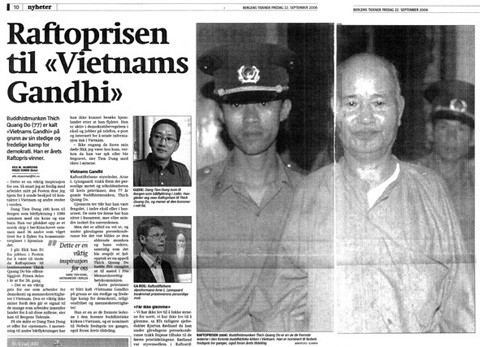 |
|
The Norwegian media reports Thich Quang Do’s Rafto Prize in 2006
|
In 2006, the Rafto Foundation in Norway awarded Thich Quang Do the prestigious “Thorolf Rafto Memorial Prize”, honouring him for “his personal courage and perseverance through three decades of peaceful opposition against the communist regime in Vietnam, and as a symbol for the growing democracy movement”. Vietnam refused to let Thich Quang Do travel to Norway to receive the Prize, despite repeated requests from the Norwegian government. Hanoi also turned down the request by Rafto Chairman, Arne Lynngård to meet Thich Quang Do, and in March 2007 Security Police arrested and interrogated Raftos Therese Jebsen as she came to Thanh Minh Zen Monastery to hand Thich Quang Do the Award Diploma. In April 2006, Thich Quang Do was awarded the “Democracy Courage Tribute” by the World Movement for Democracy at their 4th Assembly in Istanbul. In an interview on Radio Free Asia, speaking on the eve of the Communist Partys 10th Congress, Thich Quang Do made the following comments:
“There will come a time when the authorities will be unable to silence all of the people all of the time. The moment will come when the people will rise up, like water bursting its banks. Together, 80 million Vietnamese will speak with one voice to demand democracy and human rights. The government will be unable to ignore their demands, and will have to face up to this reality. Then, the situation in Vietnam will be forced to change, and a democratic process will emerge”.
Thich Quang Do pledged the UBCVs support to all peaceful movements for social justice and reform. In July 2007, he broke out of house arrest to speak at a demonstration of “Victims of Injustice”, a movement of farmers and peasants protesting official corruption and State confiscation of lands. This was the first time in 26 years he had addressed a crowd in public. It was also the first time in Communist Vietnam that such a prominent dissident had spoken out publicly for democracy and human rights. His words at the demonstration, surrounded by Security Police, were truly courageous:
“One single party cannot possibly represent more that 80 million Vietnamese people. We must have a multi-party system that gives the people wide representation. So first of all, we must settle the pressing questions of demanding justice, land rights and compensation for farmers. But after that, we must all work together for human rights, democracy and freedom. Everyone must do his part. We must work together until we succeed in winning pluralism and human rights for all the Vietnamese people. There can be no justice under a one-Party State”.
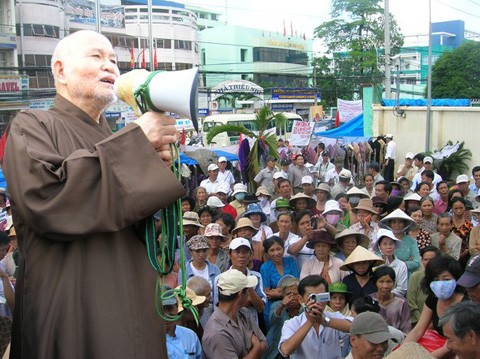 |
|
Thich Quang Do addresses the “Victims of Injustice” demonstrating
in Saigon in July 2007 |
The State-controlled media launched a vicious campaign against Thich Quang Do after this, accusing him of “inciting people to oppose the government”, being a “gang leader with wicked designs”, seeking to “disturb public order” and oppose the Communist Party. He did not step down on his principles however, and launched a fund raising campaign to support the “Victims of Injustice”, sending UBCV monk Thich Khong Tanh to distribute aid to demonstrators in Hanoi in August 2007. Thich Khong Tanh was arrested and his funds seized, but Thich Quang Do continued the movement, and today the UBCV is still providing funds for dispossessed peasants and farmers, despite government repression. Furthermore, in 2007, Thich Quang Do initiated a kind of “Grameen Bank”, providing micro-credit loans to the families of activists who had lost their means of subsistence because of their pro-democracy activities. These underground programmes are administered by more than 20 UBCV Provincial Representative Boards set up by Thich Quang Do since 2005 all over central and southern Vietnam to provide spiritual and material aid to the poor. The members of these UBCV Boards suffer persistent harassment, threats and interrogations, but are nevertheless realizing in concrete ways the UBCVs ideals of compassion and salvation.
Thich Quang Do’s vision of democracy, articulated in his appeals and Open Letters, extends far beyond Vietnams frontiers. He believes in a peaceful and democratic Vietnam that will help engender peace and stability in Asia and the world, which can be achieved through solidarity and cooperation. In September 2007, during the brutal crackdown on Buddhist monks and civilians in Burma, Thich Quang Do wrote to UN Secretary General Ban Ki-moon calling for emergency UN action to stop the violence, and addressed a message of solidarity to the Burmese people. In March 2008, following the violent repression of demonstrations in Tibet, he sent a letter of solidarity to His Holiness the Dalai Lama, calling on China to open talks with the Tibetan leader, stressing that “only dialogue, never destruction, can open the way to a lasting solution in Tibet”.
In December 2007, in the wake of widespread demonstrations staged by students and young people in Vietnam protesting Chinas claims of sovereignty on the disputed Spratly and Paracel archipelagos, Thich Quang Do issued a statement on behalf of the UBCV stating that the best way to safeguard Vietnams sovereignty and territorial integrity was for Hanoi to “pass the reins of power to the people in a society based on the separation of the three powers, multi-party democracy and the rule of law”. Because “three million Communist Party members and a 500,000-strong army have neither the authority nor the power to defend the homeland by military means, nor sufficient prestige and courage to expand political and diplomatic efforts to mobilize international support in our defence… they need the full participation of the 85 million Vietnamese population and the support of the Vietnamese Diaspora worldwide”.
On 29th April 2008, as the Olympic Torch relay arrived in Saigon, Thich Quang Do attempted to join a protest organized by young Vietnamese. However, Police blocked all demonstrations. Thich Quang Do expressed his deception in an interview for Radio Free Asia:
“In Vietnam today, young Chinese can proudly parade their flag. Whereas young Vietnamese, the children of this land, whose ancestors shed their blood to preserve our territory, civilisation and identity, are forbidden by their own government, on their own soil, from expressing their national pride and protesting this indignity”… “We must reclaim our sovereignty on the Spratly and Paracel Islands. If 85 million Vietnamese remain silent and submissive, we will lose everything. Before we realize it, it will be too late. Vietnam has already lost part of the Nam Quan Border Pass to China and much more. If we do not resist, we could lose our sovereignty again. Not just for a few decades. Remember, in our history, we were under Chinese domination for 1,000 years”.
 |
|
Thich Quang Do and Thich Huyen Quang meet in Quang Ngai
|
In June 2008, the UBCV Patriarch Thich Huyen Quang fell seriously ill. He was under house arrest at the Nguyen Thieu Monastery in the central province of Binh Dinh. Thich Quang Do defied Police barriers in Saigon and went out to be with his friend and elder in his last days. The government launched a virulent media campaign against Thich Quang Do, accusing him of attempting to hold an “illegal assembly”. When Thich Huyen Quang died on 5 July 2008, the VCP attempted to make political capital of the event by imposing a State-sponsored funeral, with speeches by officials from Hanoi. Thich Quang Do and the UBCV adamantly refused. The governments attitude raised deep indignation from the international community, with members of the US Congress, the European Parliament, governments and institutions around the globe calling on Hanoi to allow the UBCV freedom to bury its Patriarch. The force of international pressure and the determination of Thich Quang Do and the UBCV took the government by surprise. They finally allowed Thich Quang Do to hold the ceremony under UBCV auspices, with no state interference.
From under house arrest at the Thanh Minh Zen Monastery, Thich Quang Do continues to challenge the government by writing Open Letters and appeals on a wide range of issues. In March 2009, he called on all Vietnamese to stage a month of peaceful protests in their homes as a gesture of civil disobedience against a government project to mine Bauxite in the Central Highlands. The project would not only destroy the environment and culture of thousands of indigenous people, he warned, but also threaten national security in this strategic zone at the borders of Laos-Cambodia-Vietnam. On 6th April 2010, he wrote to government leaders to protest the unfair sentence of 7 years in prison on legal expert Cu Huy Ha Vu simply for his appeals for multi-party democracy. On 5th June 2011, he attempted to join a demonstration in Saigon at the call of Vietnamese youths and students protesting against Chinas incursions on Vietnamese territories and waters, but he was prevented by Police. On 21st October 2011, he sent a letter to VCP Secretary-general Nguyen Phu Trong criticizing Hanois submissive attitude to Beijing and demanding that the people be informed of the Partys policies on China:
“The VCP and the government cannot breathe forever through Chinas nostrils. The only way to avoid this is by initiating a peaceful transition to democracy, so that our country can breathe through the nostrils of the 90-million strong population of Vietnam.”
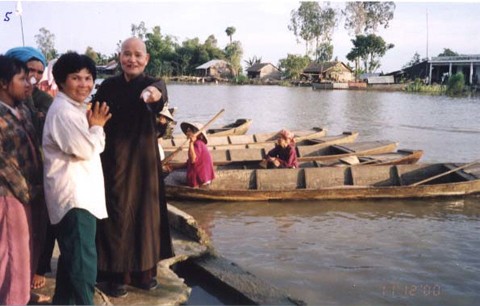 |
|
Thich Quang Do leads a UBCV relief mission to aid flood victims in the mekong delta
|
Thich Quang Do has paid a high price for his ideals. After spending 30 years in prison, exile and under house arrest, he is still subjected to restrictions at the Thanh Minh Zen Monastery in Saigon, although he has not been formally convicted of any crime. Thirteen years after he was released from prison in a government amnesty in 1998, Thich Quang Do has still not been issued with the obligatory “ho khau”, or residence permit, without which he is an illegal citizen. Many journalists and international figures who have attempted to visit Thich Quang Do have been prevented from meeting him, or subjected to Police harassments and interrogation. Therese Jebsen, Director of the Rafto Foundation, was arrested as she attempted to hand him the Rafto Award Diploma on 15th March 2007; Italian Senator Marco Perduca and MEP Marco Pannella were prevented from boarding a plane in Phnom Penh to travel to Saigon to meet Thich Quang Do in December 2009; Thor Halversson, President of the New York-based Human Rights Foundation was assaulted and detained by Police after he filmed an interview with Thich Quang Do at the Thanh Minh Zen Monastery on 16th March 2010. Fortunately, he managed to send the video out of Vietnam. It was shown at the Oslo Freedom Forum in April 2010, and on “Vietnam Day” in May 2010 at the US Congress. It can be seen on Quê Me and IBIBs website: www.queme.net
Other international awards: Thich Quang Do has been nominated 12 times for the Nobel Peace Prize. In 2008, he was proposed for the Nobel Peace Prize by 60 Members of the European Parliament, 67 Italian MPs, members of the US Congress and academics. In 2003, Thich Quang Do was honoured by the Czech “People in Need Foundation” under the auspices of former President Vaclav Havel with the Homo Homini Award in recognition of his “outstanding merits in promoting human rights, democracy, and the non-violent resolution of political conflicts”. In 2001, he received the Hellman-Hammet Award for persecuted writers. In 2006 he was awarded the Democracy Courage Tribute by the World Movement for Democracy at their assembly in Istanbul, and the Thorolf Rafto Prize by the Rafto Foundation in Bergen, Norway. Thich Quang Do is adopted by Amnesty International as a prisoner of conscience, and is an honorary member of PEN Clubs in Germany, France and Sweden. He was declared a victim of arbitrary detention by the UN Working Group on Arbitrary Detention (Opinion 21, 2.12.1997 and Opinion 18/2005).
Thich Quang Do’s written works include: Before 1975: Deliverance from bondage (novel) – Under the eaves of the derelict pagoda (novel) – Buddhist legends (3 volumes); Translation of the “Dai Phuong Tien Phat Bao An” Sutra (7 volumes) – The essence of Primitive Buddhist thought: The Essence of Hinayana thought: The essence of Mahayana thought (a trilogy) – War and Non-violence (translation into Vietnamese of the book by Radhakrishnan, former President of India): After 1975: – Observations on the grave offences committed by the Vietnamese Communist Party against the Vietnamese people and against Buddhism (published by the International Buddhist Information Bureau, Paris, 1995); “Great Dictionary of Buddhist terminology”, a 6-volume, 8,000-page encyclopaedia of contemporary Buddhist terms containing 22,608 entries and 7 million words, written during his years in internal exile and prison. The manuscript was smuggled out and printed overseas in 2000. The dictionary is banned in Vietnam; Prison Poems (published by the International Buddhist Information Bureau, Paris, 2007), a selection of some 400 poems written in exile and prison (without pen and paper, recorded by memory).
 Quê Me Quê Me: Action for democracy in Vietnam & Vietnam Committee on Human Rights
Quê Me Quê Me: Action for democracy in Vietnam & Vietnam Committee on Human Rights


